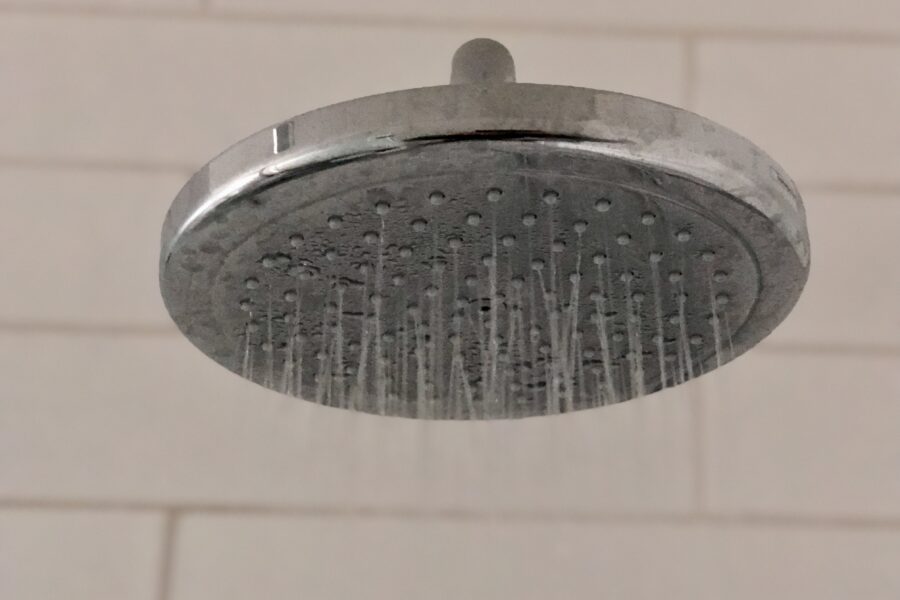I caught myself singing in the shower the other day, which surprised me. Not the singing part (I enjoy ripping a tune), but what it means to sing in the shower. I write in the shower all the time, out loud, running dialogue back-and-forth. But singing, that’s different. I genuinely believe that people who sing in the shower are happy. In fact, when my husband and I hear our kids belting out a song behind the bathroom door, we always smile at each other because it means that they’re alright. It means that, quite possibly, they’re even great. And knowing that your kids are great, well, it doesn’t get much better.
The melody I found myself humming was a hymn that my mother wrote. One of her church songs. She composed a handful of them over the years and would often perform one at a Sunday morning service to a large crowd of churchgoers. Every time that happened, every time she got up to sing, my stomach would knot up with angst. Not because I was embarrassed that my mom was center stage (okay, maybe a bit, I was a kid after all), but because she stuttered and I didn’t want to see her fail.
My mother always stuttered. Perhaps a little more or a less at times, but it never went away. When I think about her and her stuttering, what jumps out is the black rotary telephone that hung on the wall in our kitchen, its curly cord stretched long by seven family members all trying to find a little privacy in the tiny bungalow where we lived. As a kid, she would often hand me the phone unable to continue a conversation because her stutter had rendered her mute. If I wasn’t nearby, she’d pull the cord down the hallway and try to find me, squeaking out my nickname, Ceecee, and motioning me over to take the receiver. Or I’d make the call for her—to a utility or a doctor’s office—where she’d stand at my side, feeding me lines, somehow able to communicate with me but unable to converse with the stranger on the other end of the line. I never knew for sure what fueled her stutter or when it all began, but I became accustomed to finishing her sentences when she grew too tired to speak or patiently waiting for her to finish her thoughts when she didn’t want the help. Either way, communication wasn’t easy.
It’s no wonder then that I held my breath and sat on my hands as I watched her make her way to the pulpit, beautifully dressed and extra tall in her high heels. Sometimes she’d introduce the piece with a word or two, but mostly she would stand there, waiting for the pianist to begin the accompaniment. As that first note rang out, I would gather up my breath and hold it tight, praying for her to get to the end of the song without mangling the lyrics, without her voice getting stuck, which, remarkably, never happened. She never stuttered when she sang or when she spoke in tongues. Somehow those languages blessedly freed her from the disorder and allowed her to express all that she felt. Somehow she always made it to the last note, when I would exhale, relieved that she was done, and proud (maybe even more than she) of her accomplishment.
Finding myself singing that hymn surprised me because I haven’t much thought about those songs in the 25 years since she passed away. What also surprised me is that “happy” isn’t exactly a word I’ve used to describe myself these past six months. I’ve even joked that I fully expect friends to organize a meal train out of fear that my kids are starving while I rock back-and-forth all balled up in a corner. Just the other day I received a message from someone close to me who said that they prefer my angry posts because they’re funny and not as depressing as some of the others. Which I get it. I do. It’s hard to watch someone grieve, to read about their sadness, to bear witness to their pain. Human discomfort makes us all so fucking uncomfortable and prickly and, hello, alive. Which is exactly why we must persist in showing ourselves: the ugly with good, the sorrow with the joy, the failure alongside the success. And to be frank, we must also resist our compulsion to project epic amounts of curated super-happiness upon each and every moment. Or at least reveal the underbelly once in a while. Because if we don’t, happiness loses its meaning, and that moment in the shower becomes rote. That experience of recognizing unadulterated joy–witnessing my mom’s hymn pour out of me; discovering that at seven in the morning I was singing instead of reciting my dreaded to-do list; celebrating that I was actually in the shower bathing and not just pulling back my dirty hair and slapping on some deodorant—becomes generic and lost in the noise of the day.
So, I don’t know, maybe get in the shower. Sing a little. See what happens.







